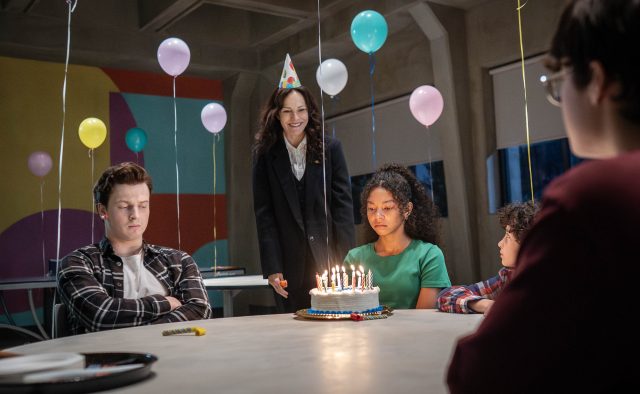The Weeds and Angels in America star opens up about her chilling turn in Stephen King’s The Institute, why horror captivates us, and the surprising way she connects with the genre.
Mary-Louise Parker is no stranger to playing complicated women — from her Emmy-winning turn in Angels in America to her unforgettable performance as Nancy Botwin in Weeds. But in The Institute, her latest role might be her darkest yet.
Entering Stephen King’s World
Based on the novel by Stephen King, The Institute follows a boy named Luke who’s kidnapped and held at a mysterious facility full of kids with strange powers. Parker plays the woman running the show — a figure as ruthless as she is self-righteous.
“She feels it’s for the greater good,” Parker tells Gayety. “That’s the most dangerous kind of villain, because they’ll stop at nothing.”
Despite the character’s emotional coldness, Parker found complexity in her interactions with the children. “She didn’t have a natural maternal sense,” she explains. “So she had to summon whatever she could… If she pulled it off at all, it was entirely by strength of will.
“There’s something kind of to admire about that,” she adds, “although it’s with an absolute absence of morality or empathy or kindness.”
Stepping into the Stephen King universe is no small feat, but Parker is thrilled to join the ranks of his iconic characters. “I think he writes them so well that you don’t want to see anybody else step into them,” she says. “I feel super lucky that I got this one.”

The Power of Horror
When asked why horror remains such a magnetic genre, Parker gets personal — especially when thinking about how it resonates with younger viewers and queer audiences alike.
“I’ve thought about this a lot because my kids are really into horror, and I just don’t understand it,” she says with a laugh. “My son especially was the most sensitive kid, and I never would’ve predicted it. But I think it has something to do with, especially for people who have a lot of anxiety — if you’re watching a horror film, it’s like, this is the allotted period of time for which this tension will occur. And you know that it’s false, that it’s going to end, and you know that there’s going to be a release.”
“So it’s almost like corralling whatever anxiety that you have or tension or unease within yourself,” she continues, “and almost like holding it and manipulating it in such a way so that it’s not coming back and hurting yourself, if that makes any sense.”
Though she admits, “I’m such a chicken, I just can’t watch anything scary,” she acknowledges why horror has become such a dominant genre, especially for younger audiences. “It’s a very anxious generation, young. Which is understandable. They’ve been dealt… you guys, everyone has been dealt such a hard hand and has had so much to contend with that other generations just don’t even understand.”



